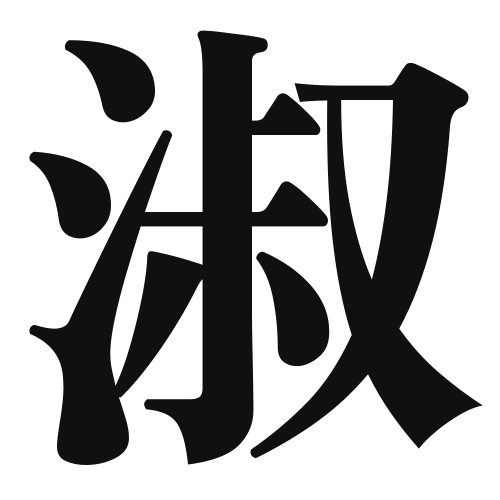1. Overview of Meaning
The kanji “淑” (shuku) generally means “gentle,” “graceful,” or “virtuous.” It conveys a sense of elegance and refinement, often associated with a calm and composed demeanor.
2. Formation and Radical
Formation of the Kanji: The kanji “淑” is a phonetic-ideographic character (形声文字). It combines the water radical (氵) on the left, which relates to fluidity and gentleness, with the phonetic component “熟” (shuku) on the right, which means “ripe” or “mature.” This combination suggests a mature and gentle quality, much like the calmness of water.
Radical: The radical of “淑” is “氵” (water), indicating its connection to fluidity and gentleness.
3. Examples of Usage
Common Words and Phrases:
- 淑女 (shukunan) – “gentlewoman” or “lady”
- 淑徳 (shukutoku) – “virtue” or “gracefulness”
Example Sentences in Daily Conversation:
- 彼女は本当に淑やかな人です。 (Kanojo wa hontō ni shukuyakana hito desu.) – “She is truly a graceful person.”
- 淑女のように振る舞ってください。 (Shukunan no yō ni furumatte kudasai.) – “Please behave like a lady.”
4. Synonyms and Antonyms
Similar Kanji:
- 優 (yū) – “gentle” or “superior,” which also conveys a sense of kindness but can imply a higher status.
- 麗 (rei) – “beautiful,” which focuses more on physical beauty rather than character.
Antonyms:
- 粗 (so) – “rough” or “coarse,” which represents the opposite of gentleness and refinement.
- 悪 (aku) – “evil” or “bad,” which contrasts with the virtuous aspect of “淑.”
5. Cultural and Historical Background
Connection to Japanese Culture: The concept of “淑” is deeply embedded in Japanese culture, where grace and virtue are highly valued, especially in traditional arts such as tea ceremony and calligraphy.
Proverbs and Idioms:
- 淑女は言葉に気をつける (Shukunan wa kotoba ni ki o tsukeru) – “A lady is careful with her words,” emphasizing the importance of grace in communication.
